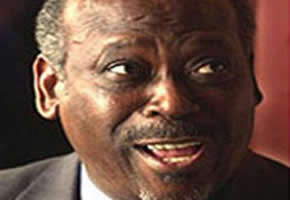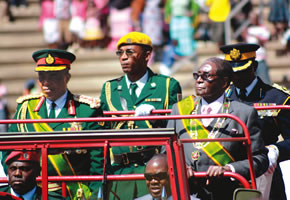Street names not mere signposts

suburb, city or country.
By so doing, their names are carried forward to the next generations.
This is also a way of teaching history.
When an elder is asked by the young why a certain street was given a name of a particular person, the explanation of the life of the person is translated into a lot of things and the history of that particular township, suburb, city or country is seen through the life of the person who is named after a particular street.
In the township where I grew up, there are streets that were named after those who made the township a better place to live; those who were into politics, businesspeople, community leaders etc.
There are many streets and institutions that were named after those who served our community.
One street which was popular was Mzingeli Street named after Mzingeli, a trade unionist who was very popular in the 1940s up to the 1960s.
I walked Mzingeli Street almost everyday when I was growing up, when going to school, the market place and just going around my area.
And today when I visit Mbare, I use the street often.
He also owned some shops at what we called kumabheka (at the bakers), the Community Centre.
His shops were at the corner as we entered the complex.
He was very much respected by people in our area. This made me want to know more about him. When I asked my parents about the man they told me that he was one of the early trade unionists and activists.
They explained to me how important trade unionism was and how trade unionists had fought for black people to be recognised as human beings.
This is one of the men who led strikes to press for better living standards for black people.
He also fought for families to live in the city.
The city was meant for men who had come to work and there was no room for women and children as they were supposed to live in rural areas.
But people like Mzingeli challenged authorities and women and children became part of the city.
Although I seemed not to understand what my parents were talking about at that time, it is amazing how the mind keeps almost everything that we are told and like a computer, the file one day just pops up and one gets to understand the stories.
Today, when my grandchildren ask me why the road was named after Mzingeli I will tell them the beginning of the story of trade unions and nationalism and the movement of blacks to the city trying to have a better life.
Roads and institutions carry and preserve the names of our heroes and those heroes become accessible as it becomes easy to tell the story to the young ones.
I had never been to Mzingeli’s house which is in 4th Avenue in Mbare, yet I grew up in 7th avenue.
Last week while I was passing through Mzingeli Street I asked myself, I have heard so much about Mzingeli, saw him when I was young and yet I have never been to his place.
I went to 4th Avenue and asked one of the few remaining old people in the street for direction.
A woman took me to Mzingeli’s house where we found the great granddaughter in law who lives at the house with her husband who is the great grandchild of Mzingeli.
When I got to Mzingeli’s house I felt good, it is a shrine in my area.
I was happy that this house still stands and the family did not think of selling it. As an archivist I value such places as they tell us where we are coming from.
According to the African Nationalist in Rhodesia Who is Who compiled by Diana Mitchell and Robert Cary 1977: Charles was the 5th of a family of nine children (two boys and seven girls) did not go to school until he was 15-years-old as was the case in those early days.
He was sent to Empandeni where he embraced the Roman Catholic Faith. After completing primary school he went to work in South Africa as a domestic servant, and soon came under the influence of the trade unionist, Clement Kadali.
He moved from South Africa – first to Bechuanaland (now Botswana) and subsequently to Livingstone and Broken Hill (now Kabwe) 2, in Northern Rhodesia (now Zambia).
Returning to Bulawayo, he started a branch of the Industrial and Commercial Workers Union (ICU).
He later transformed the organisation and led it as the Reformed Industrial and Commercial Workers Union (RICU).
Charles Mzingeli moved to Salisbury in 1929 and became one of the earliest activists while earning his living by a grocer’s shop in Harare.
For many years he was the focal point of grievances for urban workers and even rural people.
He was regarded by the Government of that time as a “dangerous communist”.
In 1930 he was arrested in Salisbury for making a subversive speech.
However, he was not brought to trial, being sent instead to face a similar charge which was then outstanding in Murehwa.
For this offence he was fined 30 pounds, or six months in prison.
After he had been only three weeks in prison, his fine was paid and he was released.
His most significant contribution (Shamuyarira calls it ‘monumental) to the history of African nationalism was his absolute determination to stamp out tribalism.
His union made it a deliberate policy to have people from the major tribal groups at its offices in Bulawayo and Salisbury.
In 1951 he became interim chairman of the All-Africa Convention, established on the initiative of Harry Nkumbula to unite all those African groups in Southern Africa which were in the opposition to the proposed Central African Federation.
He was angered when Nkomo (Father Zimbabwe Joshua Mqabuko Nkomo), who had joined the AAC, attended the talks in London on Federation.
When Nkomo subsequently denied the Federal Proposals, Mzingeli continued to work in AAC, serving under Nkomo (the organisation’s president) until 1953 when the final decision to create the Federation was made.
The emergence in 1956, in Salisbury, of the Youth League with entirely new objectives challenging the fundamental laws of the country rather than merely trying to ameliorate their effects on the
African people – started the decline of Mzingeli’s public career.
His former secretary in the RICU, George Nyandoro joined with a group of young men James Chikerema, Eddison Sithole, Henry Hamadziripi and Thompson Gonese in an all – out effort to break his power. They succeeded by shouting him down at his meetings and by removing him from the chairmanship of the Harare Advisory Board, a position he had occupied unchallenged for 10 years.
He surprised his followers by joining his former adversaries in the United Federal Party. He led the Inter – Racial Association in the last phase of its existence before its demise in 1960, and helped to introduce the A and B Roll franchise arrangements (which had been designed by Dr. Morris Hisrch) after attending the 1961 Constitutional Conference as a Government delegate.
Inspite of his apparent defection from the nationalist cause in his later years, Charles Mzingeli is regarded as an important figure in the struggle for political power.
He constitutes a link with the early years by virtue of his age; moreover his action against Government actions – at a time when virtually many Africans were inactive in the aftermath of military defeats of 1896-97 – provided a courageous example for those who came after him.”
Mzingeli passed on, on June 14, 1980.
Mr Michael Mataure who was MP for Chimanimani between 1990-2000 draws a lot of inspiration from his grandfather Charles Mzingeli,
“He was a man of principle, was consistent, he was very humble, he did not seek glory. He is one of those unsung heroes,” said Mr Michael Mataure.
We will always remember his work and thank him.
When you walk in Mzingeli Street, remember he gave his life selflessly for our nation,
To all those who gave up their lives to set us free; thank you.
Joyce Jenje-Makwenda is a researcher, archivist, author, producer andfreelance journalist. She can be contacted on: [email protected]









Comments